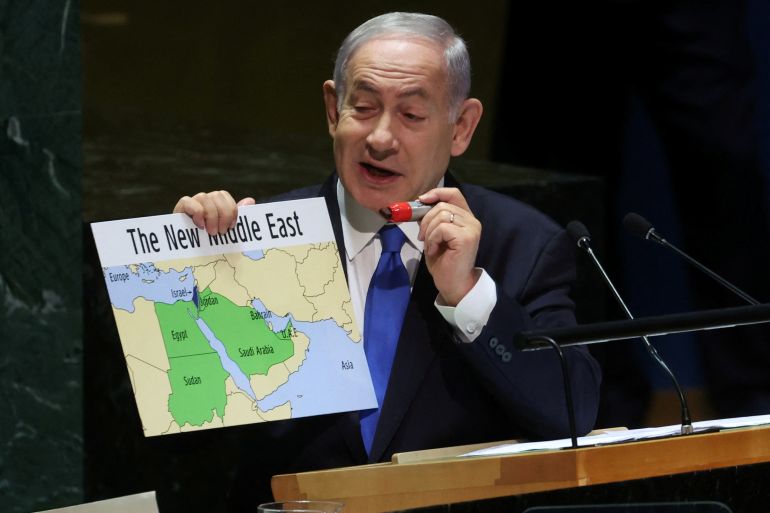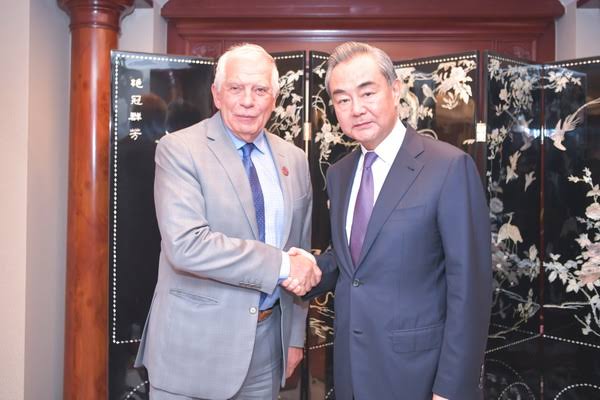Israeli Prime Minister Benjamin Netanyahu addressed the United Nations General Assembly with a resolute message, underlining the significance of the recent “normalization” agreements between Israel and Arab nations. In his speech, he emphasized that Palestinians must not possess a “veto” over such crucial diplomatic pacts, focusing particularly on the prospects of formal relations between Israel and Saudi Arabia. This bold stance comes as part of Netanyahu’s broader vision for peace in the Middle East, which aims to foster diplomatic ties among Arab states, irrespective of the longstanding Palestinian issue.
A Bold Vision for Middle East Peace
In his address to the UN, Prime Minister Netanyahu laid out his vision for achieving peace in the turbulent Middle East. While expressing his ongoing commitment to pursuing peace with the Palestinians, he strongly asserted that Palestinian authorities should not wield a veto over newfound peace treaties with Arab nations. Netanyahu argued that a broader peace across the region could bring significant benefits to the Palestinian people, emphasizing that they should be part of the process without having the power to obstruct it.
This vision comes in the wake of historical “normalization” agreements facilitated by former US President Donald Trump’s administration, leading to diplomatic relations between Israel and the United Arab Emirates, Bahrain, Morocco, and Sudan. These agreements marked a departure from the previous stance of conditioning recognition of Israel on the establishment of a Palestinian state with East Jerusalem as its capital, as outlined in the Arab Peace Initiative.
However, Netanyahu’s speech was not without controversy, as he brandished two maps of the Middle East that depicted the occupied Palestinian territories, the West Bank, Gaza, and Syria’s Golan Heights as part of Israel. This move raised concerns about Israel’s approach to territorial disputes and its stance on the Palestinian issue.
Lauding the Saudi Arabia Deal Prospects
A significant portion of Netanyahu’s address centered on the prospect of a formal normalization agreement with Saudi Arabia. Although unofficial ties between Israel and Saudi Arabia have been strengthening over the years, the Israeli Prime Minister argued that an official diplomatic accord could be transformative for the entire region. Netanyahu expressed optimism, asserting that peace between Israel and Saudi Arabia could potentially bring an end to the Arab-Israeli conflict and inspire other Arab states to normalize relations with Israel. He framed it as a step towards broader reconciliation between Judaism and Islam, Jerusalem and Mecca.
Saudi Arabia’s stance on normalizing ties with Israel had been rooted in the Arab Peace Initiative, but recent statements from Saudi Crown Prince Mohammed bin Salman signaled a potential shift towards a US-backed deal with Israel, suggesting that the two nations were moving closer to formalizing their relations.
Netanyahu Praises Biden Amid Calls for Stronger Iran Stance
Despite past differences, Prime Minister Netanyahu took the opportunity to commend US President Joe Biden’s efforts in securing a potential Israel-Saudi Arabia deal. This gesture of praise comes after reported disagreements between the two leaders earlier in the year regarding changes to Israel’s judiciary system. However, Netanyahu reiterated the “ironclad” US support for Israel while emphasizing their shared optimism for achieving peace.
The Israeli Prime Minister’s speech also focused on Iran as a primary source of conflict in the Middle East, urging the international community to take a robust stance against Tehran’s nuclear program. Netanyahu highlighted Iran’s violations of the 2015 nuclear deal and called for the reimposition of sanctions to curb Iran’s nuclear ambitions, emphasizing the need for a credible military threat against Iran.
Following the speech, Israeli diplomats clarified Netanyahu’s statement, indicating that he meant a “credible military threat,” aligning with his previous statements. As the region continues to grapple with complex geopolitical challenges, Netanyahu’s address at the UN underscores Israel’s commitment to regional diplomacy and stability.
















